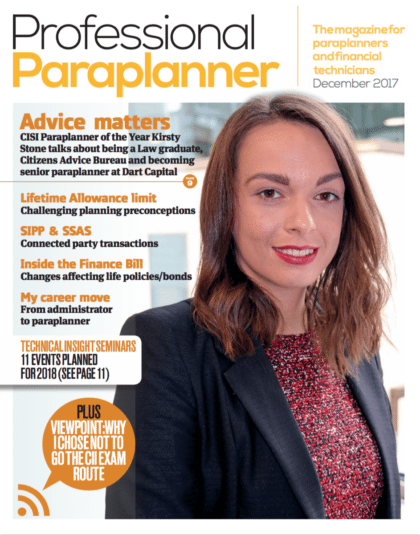Rob Kingsbury talked to this year’s CISI Paraplanner of the Year, Kirsty Stone, about being a Law graduate, her work with Citizens Advice Bureau and becoming senior paraplanner at Dart Capital
Kirsty Stone, senior paraplanner with City of London-based Dart Capital scooped this year’s Chartered Institute for Securities & Investment (CISI) Paraplanner of the Year award.
Choosing to enter the CISI award was a given, she says, because, as a wealth manager, Dart Capital belongs to the professional body. “My CPD is through the CISI and I appreciate what the CISI is doing to promote financial planning alongside wealth management. It’s the same ethos we have at Dart and I think that is an important route for the industry to follow,” she says.
Kirsty brought a range of experiences to her award entry, including a degree in Law, work for the Citizens Advice Bureau, a year at Pension Wise providing guidance to consumers, as well as time as an administrator for an IFA and her current role as senior paraplanner.
The award process, she says, was challenging in a way she hadn’t expected. It required entrants to provide a paraplanning solution for a case study. “I looked at it and thought I could do it, so I spent a Sunday writing and then going over and over it until I thought I’d got it right,” Kirsty says.
“The challenge, I found, was that in the real world there would have been so much more you would have asked the client in order to get the best information and picture of them that you could before you put the recommendation together. And that’s what I put into the first page of my submission and what I said to the judges in the face-to-face interview.
“They asked me a lot of questions about the case study, my background, what I did at Citizens Advice Bureau, and what I do at Dart Capital.”
As well as winning the award and “being recognised for what you do”, networking at the awards dinner was also a great part of the overall experience, she says. “I met some fantastic people, who were also focussed on financial planning and it was great to compare notes. It’s very easy to become isolated within a firm, so it’s nice to be able to talk to other paraplanners and have that confirmation around what you’re doing.”
Citizens Advice
It was in the third year of her four-year Law degree at Bournemouth University, which was a placement year, that Kirsty worked for the Citizens Advice Bureau. Rather than just work in a law firm for the year, she says, “I wanted to do something that would test me and challenge my understanding across a broad range of subjects, so I chose to work for Citizens Advice.
“I’m such a strong advocate of Citizens Advice now. They do such great work and the majority of people there are volunteers. If you think pension legislation is complicated, it’s nothing compared to benefits legislation and employment law. Having to get those complex pieces of legislation over to people who were being effected by them, simplifying everything down so it could be understood, was great training. It forms the basis of how I explain things to clients now.
“It’s too easy to think that if we understand it that everyone will but in reality, that’s not the case. I was dealing with quite often personal situations for people, which means you have to build a rapport with them and make sure they understand what is happening, because the decisions they would be making could impact their lives. Just as much as the financial decisions we make with clients now do.
“It was a great experience and I would recommend that anyone who wants to should have a go at it.”
Graduating from Bournemouth in 2013, Kirsty says she “kind of stumbled into financial services”, looking for a job in her home town of Taunton in Somerset. She spotted a local IFA firm was looking for a law graduate and she started at the firm as an administrator.
“I was completely ignorant of financial services and products at the time, and I got chucked in at the deep end, so I had to learn everything on the job. But I think that is a really good foundation, when you learn the basics by doing them, for progressing into other roles later on.”
While it was a transactional rather than a technical role, Kirsty began using her legal background to get into the more technical side and after 20 months with the firm it was suggested to her that she apply for a role in the new government initiative Pension Wise.
She explains: “My manager at Citizens Advice heard that Pension Wise was recruiting and, knowing I was working in financial services, she contacted me and suggested I apply.”
She became a case worker at Pension Wise, helping to guide people through the more complex pension cases. “I really had to up my pensions knowledge, which was a challenge as it was early 2015 when everything was changing. But I was able to use my legal background to understand the legislation.”
However, she became increasingly frustrated that in a guidance role she was unable to give people proper advice. “As much as we were giving people information, we were restricted on what we could say, and that meant people could come away not really knowing what or what not to do.”
Senior paraplanner
As a result, after a year she looked for another role and joined Dart Capital as a paraplanner. Using her depth of experience and knowledge to inform the role, within four months she was promoted into her current role as senior paraplanner, dealing with more complex cases, specialising in pensions but broadening out into more general advice as well.
Dart Capital offers discretionary investment management, along with financial planning and having discretionary permissions makes the paraplanning role easier, Kirsty believes, because it means recommendations can be actioned without having to go out for consent from the client. “This is great if there is a need to make a change that is particularly time sensitive – because you can be as pro-active as anything but if clients are slow to respond then it can be too late to take action”
She believes also that it adds another level of trust with the client. “People are giving us often large sums of money to manage and they are trusting us to action what we deem appropriate for their benefit. Sometimes it can take a client a while to get their head around it when they are coming from an advisory model.
“Dart’s investment side and its performance is very strong and this gives me a lot of confidence as a paraplanner because when you pair that with our financial planning side it really gives the client all they need. It really is a holistic service.
“When I was looking for a position that was what appealed to me about Dart, the fact that everything is under one roof. We can say we’re not just investment managers, we don’t just look after funds, we look after you and your family as a whole. Our financial planning side is growing all the time.”
What’s a typical day for Kirsty?
The first thing I will do is look at my calendar to see what meetings I have that day. I go to a lot of client meetings with the investment manager. The manager is key to the financial planning and is the person authorised to give advice in the firm and they have a great understanding of both the investments and financial planning. I am there in the meeting to back them up on the financial planning side.
When I was looking for a new job in financial planning, I was very clear in my mind that I didn’t want a job which was sitting behind a desk writing reports for someone I’d not met or engaged with in any way. I think as paraplanners we can get such a better picture if we do meet the client. I think also it is nice for the client to know there is someone else they can deal with in the firm.
I would strongly recommend that paraplanners attend client meetings. We have a skill set that can really help on the financial planning side. For example, we can pick up on things that clients say which investment managers and financial planners might not do, because we are coming at it from a slightly different direction.
Outside of the meetings, I’ll be writing reports and recommendations, as well as preparing ahead for individual client reviews, looking at what clients need and planning ahead.
Sometimes there is project work, for example where a particular client is approaching retirement I may spend a few days really planning out their retirement finances and what action needs to be taken, and later on I’ll help implement that too.
We’re a boutique firm and we try to see clients at least twice a year. Many clients are based in the City of London but we also have retired clients living all around the country, which means we travel every now and then so we can see clients where they are, in the north and Scotland, for example.
Most clients are high net wealth but we also run more modest portfolios, such as for the children of our clients.
Future of paraplanning
We asked Kirsty for her views on the financial planning market and where paraplanning might sit within it.
Historically, I think paraplanning has been undervalued by the industry. No-one knew what it was but it is becoming more popular – especially among young people. It offers a great foundation to understand financial services.
I think what we’re seeing is financial planning businesses moving away from individual planners having a bank of their own clients, as firms look to create more stability for themselves. Everyone will be working for the business.
We have a paraplanning team and we deal across all clients and I think a paraplanning team can offer more consistency for a firm, because it can say to clients while they may have a single point of contact in the investment manager, it is the team which is working for them on their financial planning.
I also think financial planning and paraplanning is going to become ever more important. In 20 years clients are not going to have the security of the defined benefits schemes that many people have at the moment and that’s when things like cashflow modelling are going to be crucial, both in accumulating wealth and ensuring they are not over spending in retirement.
I think there is a trend towards firms wanting a strong technical paraplanner, to focus on changes in legislation, and to have someone in the team who is up-to-date on the issues and can really understand complex situations. To have someone with those strengths and who doesn’t want to be an adviser, who wants to follow paraplanning as a career, is really valuable and in demand.
And I hope that more paraplanners will be given the opportunity to meet clients and attend client meetings.
There is so much more out there now for paraplanners to get involved in and I’d like to see paraplanning recognised as having an important part to play in the industry.





























